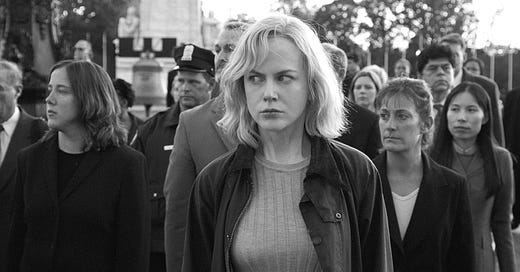After my last supper [no. 106] yesterday I went to a comedy club one of the performer’s referenced this film. There’s a scene in The Invasion—the 2007 sci-fi thriller starring Nicole Kidman—where her character, Carol Bennell, has to pretend she’s no longer human. Her body hasn’t yet been infected by the alien spores sweeping through society, but everyone around her already has. They’ve become eerily calm, eerily consistent. No joy. No sorrow. No pain. Just… compliance.
So she learns to mask. Every blink, every breath, every inch of her expression must be managed with precision. If she flinches, she’s caught. If she cries, she’s exposed. If she’s human, she’s hunted.
That scene stayed with me—not just for its cinematic tension, but because it mirrors exactly how I’ve had to move through the world with bipolar disorder. I wrote a newsletter about my experience on the 16th Of January when I was cornered by the police at The Dylan hotel in Amsterdam. They were concerned that I may be “of danger to myself” as they were tipped by someone from the Ghanaian Embassy about my content on social media.
To exist with this condition is to constantly perform a version of myself that is digestible. Quiet. Regulated. Non-threatening. When I’m “too happy,” people call it mania. When I’m “too sad,” they call it crisis. When I can’t sleep or talk too fast or go days without eating, I become a warning sign. I’ve learned to mask my suffering not for comfort—but for protection. Because the minute I unmask, the world responds not with care, but containment.
I remember vividly the time I was forcibly sectioned. Not because I wanted to harm anyone. Not because I was violent. But because I felt too much, too fast. Because my truths were inconvenient and my energy made others uncomfortable. I was criminalized for being unwell.
In The Invasion, society rewards those who are infected. The ones who show up to work, keep a steady tone, don’t cry in public. Emotions are framed as the enemy. Sound familiar?
We do the same thing with mental illness—especially bipolar disorder. People with bipolar who are masked and medicated are seen as "brave" and "responsible." But the moment we’re visibly unwell—when our masks crack—we’re locked away, sedated, discarded and relegated to the nearest crisis centre.
There’s no room for truth, only tolerance. And only if that truth is quiet.
But masking is not healing. It's survival.
And survival shouldn't be the bar we’re measured by.
So what happens when I finally unmask—when I let someone see the crying jag, the existential spiral, the joy that’s a little too wild, the sorrow that lasts too long? Most times, people don’t know what to do with me. Sometimes they panic. Sometimes they disappear.
But sometimes, they stay. Like my best friend Illi who's seen me unravel in all the motions.
And in those rare, holy moments, I realize I’m not the only one pretending not to be human.
There’s no vaccine for hypomanic madness. No cure for feeling too much. But there is solidarity in the unmasking. There is courage in staying human in a world that punishes you for it.
I’m still learning how to unmask safely. How to be visible without being devoured. How to be well without being silent.
But I will say this: I’d rather be fully human and hurting than eerily calm and erased.
Nicole’s character was trying to save her son. I’m trying to save my soul even if it costs me this thing called life.





Hi, I’ve been watching and reading your journey for a few months. You have said and written some things that I’ve experienced or thought but haven’t been able to verbalize over the years, and I can not thank you enough for that. I never wanted to be someone who reached out to you, just watch you navigate.
But… you wrote something today that is the BASE of all my own struggles.
“To exist with this condition is to constantly perform a version of myself that is digestible.” - Joseph Awuah-Darko
As I’m sitting here in my bed, since last Tuesday my husband is begging me to go outside and smoke weed to “calm down”. I know what he needs from me today is a masked wife and mother, but I can’t mask today. I take 5 prescriptions a day to make myself more palatable to those around me. My whole life I’ve been given tricks and tips to edit myself or told what people like about me and lean into that. I don’t want to whittle myself into their idea of my potential.
I just read your quote again and it made me remember that look, the long off gaze that Bourdain often (mostly) had where he looked bemused, disgusted and proud of himself for digging out a version of himself that the public liked.
Thank you
Hi, I'm a fellow bipolar, diagnosed at 24 after major psychotic episodes in the span of two years. All I can say is being vulnerable and unmasking yourself and showing up to the world takes so much courage. You've been speaking about your journey so beautifully. I'm finding a sense of belonging with your writing here. I hope you know that you're not alone. Sending you big hugs♥️